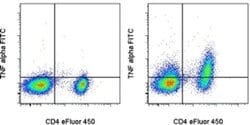Learn More
Invitrogen™ TNF alpha Monoclonal Antibody (TN3-19.12), FITC, eBioscience™
Armenian Hamster Monoclonal Antibody
Supplier: Invitrogen™ 11742382

Description
Description: The TN3-19.12 monoclonal antibody reacts with mouse, rat, and rabbit tumor necrosis factor-alpha (TNF alpha), but not with human TNF alpha. The TN3-19.12 antibody is a neutralizing antibody. Mouse TNF alpha is a 17 kDa factor produced by macrophages, monocytes, neutrophils, CD4+ T cells and NK cells. A 26 kDa form of TNF alpha is expressed as a membrane-bound molecule. TNF alpha is cytolytic and plays an important role in immune regulation. Dimers and trimers of TNF alpha have been observed. Applications Reported:The TN3-19.12 antibody has been reported for use in intracellular staining for flow cytometric analysis, cytokine neutralization, and ELISA. Fluorochrome conjugated TN3-19.12 is recommended for use in intracellular staining and flow cytometry. Functional Grade purified TN3-19.12(Product # 00-4956-58) . This can be used at less than or equal to 20 μg/mL. It is recommended that the antibody be carefully titrated for optimal performance in the assay of interest. Filtration: 0.2 μm post-manufacturing filtered.
TNF alpha is a multifunctional proinflammatory cytokine that belongs to the tumor necrosis factor (TNF) superfamily. This cytokine is mainly secreted by macrophage and bind to its receptors, TNFRSF1A/TNFR1 and TNFRSF1B/TNFBR. TNF alpha is involved in the regulation of immune cells, cell proliferation, differentiation, apoptosis, lipid metabolism, and coagulation. TNF alpha exists as a multimer of two, three, or five noncovalently linked units, but shows a single 17 kDa band following SDS-PAGE under non-reducing conditions. Knockout studies in mice also suggested the neuroprotective function of TNF alpha, and has been observed to causes tumor necrosis when injected into tumor-bearing mice. Other functions of TNF-alpha include its role in the immune response to bacterial, viral, parasitic and certain fungal infections, as well as its role in the necrosis of specific tumors. TNF alpha causes cytolysis or cytostasis of certain transformed cells, being synergistic with interferon-gamma in its cytotoxicity. This cytokine has been implicated in a variety of diseases, including autoimmune diseases, insulin resistance, and cancer.
Specifications
| TNF alpha | |
| Monoclonal | |
| 0.5 mg/mL | |
| PBS with 0.09% sodium azide; pH 7.2 | |
| P06804, P16599 | |
| Tnf | |
| Affinity chromatography | |
| RUO | |
| 21926, 24835 | |
| 4°C, store in dark, DO NOT FREEZE! | |
| Liquid |
| Flow Cytometry | |
| TN3-19.12 | |
| FITC | |
| Tnf | |
| APC1 protein; Cachectin; C-domain 1; C-domain 2; cTNF; DADB-70P7.1; DIF; ICD1; ICD2; Intracellular domain 1; Intracellular domain 2; N-terminal fragment; NTF; RATTNF; Tnf; TNF alpha; TNF superfamily; TNF a; TNF, macrophage-derived; TNF, monocyte-derived; TNFA; TNF-a; TNFalpha; TNF-alpha; Tnfsf1a; TNFSF2; TNFa; TNLG1F; Tumor necrosis factor; tumor necrosis factor (TNF superfamily, member 2); tumor necrosis factor alpha; tumor necrosis factor alpha (cachetin); tumor necrosis factor alpha precursor; tumor necrosis factor ligand 1F; tumor necrosis factor ligand superfamily member 2; Tumor necrosis factor, membrane form; Tumor necrosis factor, soluble form; tumor necrosis factor-alpha; tumor necrosis factor-alpha precursor; tumor-necrosis factor; tumour necrosis factor | |
| Armenian Hamster | |
| 100 μg | |
| Primary | |
| Mouse, Rat | |
| Antibody | |
| IgG |
Safety and Handling
The Fisher Scientific Encompass Program offers items which are not part of our distribution portfolio. These products typically do not have pictures or detailed descriptions. However, we are committed to improving your shopping experience. Please use the form below to provide feedback related to the content on this product.
